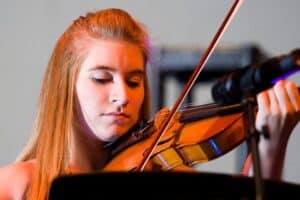World Music Day: The healing power of music
 Music Therapist Izzy Swinhoe-Standen has been coming to our Home in High Wycombe since the start of the year, before the lockdown was enforced by the coronavirus pandemic. Here, to mark World Music Day, she explains the power and importance of music.
Music Therapist Izzy Swinhoe-Standen has been coming to our Home in High Wycombe since the start of the year, before the lockdown was enforced by the coronavirus pandemic. Here, to mark World Music Day, she explains the power and importance of music.
Whether you’re aware of it or not, music plays a massive part in all our lives. It can bring pleasure or spark sadness. It can help reminisce and connect with a loved one. It can connect with someone who might not be engaged with everyday life. This is especially important when caring for older people and people living with dementia.
I’m a qualified Music Therapist. I have a BSc Honours in Music and Psychology and have also completed an intensive two-year Masters course in Music Therapy. I’m a member of the Health & Care Professions Council.
I’ve always been quite musical, it’s been a hobby my whole life, and I’m interested in mental health and helping people in general, so this was a way of combining everything I like and wanted to do in one career.
My work sees me go into care homes and deliver music therapy sessions to groups and individuals. I work to clinical aims, especially when dealing with an individual. There are psychological and clinical goals and aims with each particular person.
I sing and play instruments during the sessions, which usually last between 45 minutes and one hour. I start with a song that is familiar to them, such as ‘Oh What a Beautiful Morning’. It’s always something that is familiar and easy to sing along with. I play songs from musicals and post-World War II. Some war songs are relevant, but I tend to focus on the 1950s and 60s because of the age group. There are also popular songs like ‘Daisy Daisy’, ‘Coming Round the Mountain’ and ‘My Bonnie Lies Over the Ocean’, so my sessions are a mix of songs.
I usually play the piano, guitar or violin – the violin is quite an evocative instrument for people with dementia, and they say stringed instruments have a ‘human voice’. I also hand out small instruments – tambourines, maracas, shakers, to help people be more involved and make a little more noise.
Throughout a session, I’ll be looking for some kind of therapeutic interaction between myself and an individual. I’m looking for a level of engagement – that could be a head lifting, eye contact, singing or tapping feet.
Music is particularly important for people living with dementia as social engagement can be lost in dementia. To have that relationship through music is very important. They say music and rhythm are the last things to go in the brain when someone is living with dementia, and that really demonstrates its power and importance. Music and song invoke memories and emotions when nothing else can.
I try to focus on the emotions of individuals. If someone says a song makes them unhappy, I would meet their emotions and improvise to explore the feeling. Another song can spark sad memories, and that can be quite painful. I’d acknowledge the unhappy feeling, and maybe play a sad song. I’d then try and lift the mood with a different song or a different tempo. It’s important to acknowledge it’s not all about being happy and having fun all the time. It’s about meeting residents where they are at in their current state, and the expression of emotions is really important. Sometimes it’s good to have no words and to play something classical or a theme tune. Just to be quiet, and listening and reflective can be really useful too.
It’s so satisfying when I see a spark in someone, when someone who might not be engaged in everyday life connects with a song… maybe they smile, tap their feet or fingers, or sing along, I think that’s amazing. It’s great when people get up and start dancing too. I love it when people engage with the music, it’s really powerful. And, of course it’s great when carers tell me how helpful the sessions have been. That’s really nice to hear, and it’s good to know that I’m doing my job well.
I love coming to Royal Star & Garter and playing for the residents. The Home understands the importance of music and its healing powers. There’s always music being played over the speakers, or an activity linked to music. I’m really impressed, I think it’s brilliant. It’s a great Home, and overall, it’s so encouraging to see the level of care and attention the residents receive.
I’m lucky that I can use my love for music to help people. I’m passionate about what I do, and grateful I am able to do it.
Our work with music and residents living with dementia has been supported by the Armed Forces Covenant Fund Trust through their Positive Pathways programme.
